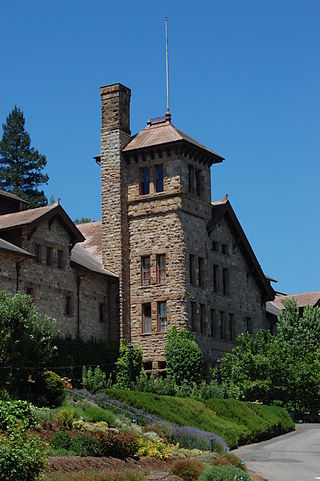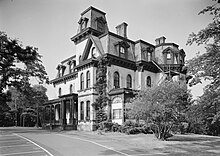
The State University of New York at Delhi is a public college in Delhi, New York. It is part of the State University of New York (SUNY) system. Over 3,000 students attend the institution.

The George Brown College of Applied Arts and Technology is a public, fully accredited college of applied arts and technology with three campuses in downtown Toronto. Like many other colleges in Ontario, George Brown College was chartered in 1966 by the government of Ontario and opened the next year.

The Culinary Institute of America (CIA) is a private culinary school with its main campus in Hyde Park, New York, and branch campuses in St. Helena and Napa, California; San Antonio, Texas; and Singapore. The college, which was the first to teach culinary arts in the United States, offers associate, bachelor's, and master's degrees, and has the largest staff of American Culinary Federation Certified Master Chefs. The CIA also offers continuing education for professionals in the hospitality industry as well as conferences and consulting services. The college additionally offers recreational classes for non-professionals. The college operates student-run restaurants on its four U.S. campuses.

Monroe University is a private for-profit college in New York City. It was founded in 1933 and has campuses in the Bronx, New Rochelle and Saint Lucia, with degree programs also available through Monroe Online. The college is named after James Monroe, the fifth president of the United States. It is accredited by the Middle States Commission on Higher Education.

James Rowland Angell was an American psychologist and educator who served as the 16th President of Yale University between 1921 and 1937. His father, James Burrill Angell (1829–1916), was president of the University of Vermont from 1866 to 1871 and then the University of Michigan from 1871 to 1909.

Algonquin College of Applied Arts and Technology is a publicly funded English-language college located in Ottawa, Ontario, Canada. The college has three campuses, all in Ontario: a primary campus located in Ottawa, and secondary campuses located in Perth and Pembroke. It offers bachelor's degrees, diplomas, and certificates in a range of disciplines and specialties. The college serves the National Capital Region and the outlying areas of Eastern Ontario, Western Quebec, and Upstate New York. It has been ranked among the Top 50 Research Colleges in Canada and has been recognized as one of Canada's top innovation leaders. The enabling legislation is the Ministry of Training, Colleges and Universities Act. It is a member of Polytechnics Canada.
Johnson & Wales University (JWU) is a private university with its main campus in Providence, Rhode Island. Founded as a business school in 1914 by Gertrude I. Johnson and Mary T. Wales, JWU enrolled 7,357 students across its campuses in the fall of 2020. The university is accredited by the New England Commission of Higher Education.

The Culinary Institute of America at Greystone is a branch campus of the private culinary college the Culinary Institute of America. The Greystone campus, located on State Route 29/128 in St. Helena, California, offers associate degrees and two certificate programs in culinary arts and baking and pastry arts. The CIA at Greystone and the Culinary Institute of America at Copia make up the school's California branch.

Hudson County Community College (HCCC) is a public community college in Hudson County, New Jersey.

Illinois Institute of Art – Chicago was a for-profit art and culinary school in Chicago, Illinois. It briefly operated as a non-profit institution before it closed in 2018. The school was one of a number of Art Institutes, a franchise of for-profit art colleges with many branches in North America, owned and operated by Education Management Corporation. EDMC owned the college from 1975 until 2017, when, facing significant financial problems and declining enrollment, the company sold the Illinois Institute of Art – Chicago, along with 30 other Art Institute schools, to Dream Center Education, a Los Angeles–based Pentecostal organization.
Los Angeles Mission College is a public community college in Los Angeles, California. It is part of the Los Angeles Community College District and it is accredited by the WASC Accrediting Commission for Community and Junior Colleges.

Copia: The American Center for Wine, Food & the Arts was a non-profit museum and educational center in downtown Napa, California, dedicated to wine, food and the arts of American culture. The center, planned and largely funded by vintners Robert and Margrit Mondavi, was open from 2001 to 2008. The 78,632-square-foot (7,305.2 m2) museum had galleries, two theaters, classrooms, a demonstration kitchen, a restaurant, a rare book library, and a 3.5-acre (1.4 ha) vegetable and herb garden; there it hosted wine and food tasting programs, exhibitions, films, and concerts. The main and permanent exhibition of the museum, "Forks in the Road", explained the origins of cooking through to modern advances. The museum's establishment benefited the city of Napa and the development and gentrification of its downtown.

The Art Institute of Fort Lauderdale is a former for-profit art and culinary school in Fort Lauderdale, Florida which closed in 2018. The school was one of a number of Art Institutes, a franchise of for-profit art colleges with many branches in North America, owned and operated by Education Management Corporation (EDMC). EDMC owned the college from 1973 until 2017, when, facing declining enrollment, multiple fraud charges brought by faculty and students, and accreditation issues at some of its schools, the company sold the Art Institute of Fort Lauderdale, along with other properties, to Dream Center Education, a Los Angeles-based Pentecostal organization. Dream Center Education planned to operate the school, along with others it acquired, as a non-profit. The plan proved unsustainable, with Dream Center permanently closing 18 Art Institute schools, including Art Institute of Fort Lauderdale, at the end of 2018.

Lawrence Timothy Ryan is an American chef and the fifth and current president of the Culinary Institute of America (CIA). Ryan, a certified master chef, graduated from the CIA in 1977 and joined the school's faculty in 1982, and later moved to administration before heading the education division. In 2001, he became the first CIA alumnus and faculty member to become president of the college, in 2001. Prior to returning to the CIA as a faculty member, he spent five years as a chef in different aspects of the culinary industry.

Pioneer Pacific College was a private for-profit college with its main campus in Beaverton, Oregon. Founded in 1981, it primarily offered Associate degrees and certificate programs.
NorthWest Arkansas Community College (NWACC) is a public community college with its main campus in Bentonville, Arkansas. Total enrollment for the fall semester of 2018 was 8,308.

Betts House, also known as the John M. Davies House or Davies Mansion, is a mansion owned by Yale University in the Prospect Hill Historic District of New Haven, Connecticut. Completed in 1868 and designed by Henry Austin, it was sold to Yale in 1972 and is now home to the Yale Center for the Study of Globalization.
The Culinary Institute of America at Copia is a branch campus of the private culinary college the Culinary Institute of America. The CIA at Copia, located adjacent to the Oxbow Public Market in downtown Napa, California, opened its doors in 2016. The CIA venue provides food- and wine-related courses to visitors. The CIA at Copia and The Culinary Institute of America at Greystone make up the school's California branch.

The Culinary Institute of America at Hyde Park is located in the town of Hyde Park, New York, between the Hudson River and U.S. Route 9. The Culinary Institute of America (CIA) campus offers associate and bachelor's degrees and certificate programs in culinary arts and baking and pastry arts. It is the school's primary and largest campus, with about 2,300 students.
Katharine Cramer Angell was one of two named founders of the Culinary Institute of America.


















